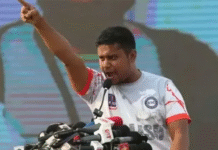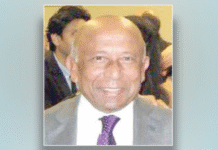TBS

After nearly six years, the much-anticipated Dhaka University Central Students’ Union (Ducsu) election is finally set to take place on 9 September, 2025.
The preliminary list of candidates has already been published. According to this list, 48 candidates are running for the VP (Vice President) post, 19 for the GS (General Secretary) post, and 28 for the AGS (Assistant General Secretary) post.
Including other positions, a total of 462 candidates have been declared eligible to contest. Notably, Ducsu has 28 posts including VP, GS, and AGS.
On the other hand, the final voter list shows a total of 39,775 registered voters, with 20,873 male and 18,902 female students eligible to vote in this election.
A lively campus abuzz with election talk
As the election approaches, Dhaka University campus is now abuzz with excitement and anticipation. From TSC to the dormitories to Madhur Canteen—student discussions everywhere seem to revolve around one central topic: the Ducsu election.
Who will emerge as a capable candidate? What qualities should a student representative have? How satisfactory are the manifestos of the candidates? These are the questions dominating conversations across campus. Heated debates and hours-long discussions are unfolding as students weigh their choices carefully, trying to assess who will truly work for their benefit.
Regardless of calculations and predictions, one thing is certain, after a long break, the return of the Ducsu election has sparked widespread enthusiasm among students, as reflected in every discussion and social media posts.
What kind of representatives do students want?
Kazi Takmir, a student of the Sociology Department from the 2021–22 session, stated, “I don’t want to vote for someone pushing a political party’s agenda. I will vote for someone who works solely for the welfare of students. A true representative is someone who can effectively communicate students’ demands to the administration and work collaboratively to address them.”
Echoing this sentiment, Jannatul Adnan Jinia, also from the same department and a resident of Bangladesh Kuwait Maitree Hall, said, “We want student-friendly representatives. Those of us who’ve been living in dorms since the beginning of our university life know the daily struggles— from cramped hostel rooms to problems in classrooms. Housing crises, poor food quality, and many other basic issues have become part of our everyday lives. The candidate who will work genuinely to resolve these issues is the one we’ll support.”
Sheikh Shabab Tawkee Rupok, a student from the 2022–23 session of the Department of Development Studies, said, “There’s often a long gap between classes, but there are very limited options for spending that time productively. There are not enough common rooms or rest areas, so we go to the next class feeling tired, which affects our ability to learn.
“One of the biggest problems I’ve faced since the beginning of my campus life is the lack of good quality food. I believe the candidate who can solve these problems effectively is the one deserving of our vote. And I hope that person wins”.
Candidates’ perspectives and plans
It’s not just the poor quality of food or the accommodation crisis; Dhaka University faces a range of other problems as well. Many are concerned about the declining cultural environment on campus. They say that despite being the premier institution of higher education in the country, students are unable to properly engage in healthy cultural practices.
To rejuvenate the university’s cultural atmosphere, Anid Hasan, a candidate for the position of Literary and Cultural Affairs Secretary from the Swatantra Chhatro Oikko (Independent Student Unity) panel and a student of the Department of Geology, shared several plans.
He said, “We have undertaken several important initiatives to bring back the fading cultural spirit of the university. Among them is organising open mic events to discover hidden talents among students. In addition, we aim to arrange diverse and innovative cultural programmes every month to encourage students’ continuous participation in cultural activities.”
“Another major initiative is to develop an online directory, website, or app that will feature profiles of individuals involved in various cultural fields within the university. This will help streamline and facilitate the organisations organising cultural events on campus,” he added.
We want student-friendly representatives. Those of us who’ve been living in dorms since the beginning of our university life know the daily struggles. Housing crises, poor food quality, and many other basic issues have become part of our everyday lives. The candidate who will work genuinely to resolve these issues is the one we’ll support.
Rupaiya Shrestha Tongchangya, a candidate for the position of Career Development Secretary from the same panel, said, “Bangladesh’s talented students come to this university and open new doors of opportunity for themselves. However, unfortunately, many of them fall behind in the competitive job market after completing their graduation due to a lack of skills and proper guidance.
“This clearly indicates that our academic syllabi are failing to keep pace with the demands of the current time. I want to work to address this challenge. My primary goal is to take practical initiatives so that students can acquire the necessary skills and guidance right from the beginning of their university life.”
Students demand a supportive, student-centric campus
Overall, Dhaka University students are calling for a more supportive and student-friendly environment, one that ensures not just academic excellence but also a livable, comfortable daily experience. They hope for better rest spaces and common rooms between classes, as well as access to affordable and nutritious food. Many students also wish for extended library hours so they can study more efficiently.
Beyond academics, they believe co-curricular and non-academic activities should be more accessible. The lack of creative infrastructure such as art spaces, workshop centres, and rehearsal rooms is also being felt deeply. The absence of open fields or clean recreational areas, along with constant dust and crowding, has made the campus feel suffocating to many.
Students are calling for a clean, dynamic, and well-planned campus, a space that encourages fresh thinking and new initiatives.
In conclusion, what students truly want is a representative who is aware of their needs, responsible in action, and genuinely committed to solving real problems.
As Ducsu elections return after a long gap, they carry with them not only hopes of leadership but the possibility of meaningful change. Now, the question remains—who will be that face of change?









